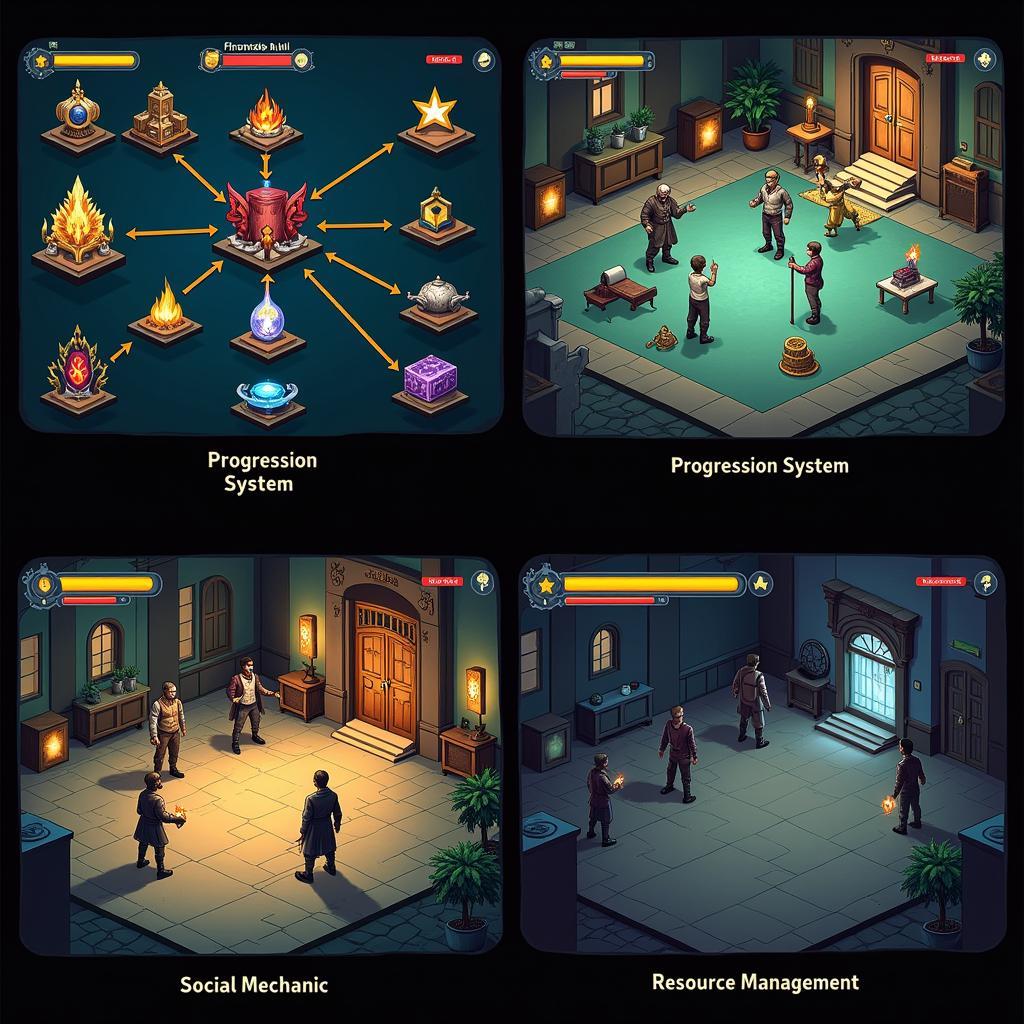From pixelated sprites to intricately rendered worlds, video games captivate us with their ability to transport us to new realities. But behind the dazzling graphics and engaging narratives lies a foundation built upon the bedrock of Mechanics Choice. This often overlooked aspect of game development is what truly breathes life into the virtual experiences we crave. It dictates how players interact with the game world, the challenges they face, and ultimately, the enjoyment derived from conquering those obstacles.
Understanding the Core: What is Mechanics Choice?
At its heart, mechanics choice refers to the deliberate decisions made by game developers regarding the rules, systems, and actions that govern gameplay. It’s about crafting the very DNA of the experience, determining how players navigate the game world, interact with objects and characters, and progress through the challenges presented. Imagine building a house: the mechanics are the bricks, mortar, and beams that hold everything together.
 mechanics choice analogy
mechanics choice analogy
The Ripple Effect: Impact on Player Experience
The significance of mechanics choice cannot be overstated. It directly influences every facet of the player’s journey, shaping their emotions, engagement, and overall satisfaction. A well-crafted mechanic can mean the difference between frustration and exhilaration, tedium and immersion.
Consider the simple act of jumping in a platformer. A single jump mechanic can be manipulated in countless ways, each yielding a distinct feel. A floaty jump might encourage exploration and careful timing, while a double jump could introduce an element of momentum and acrobatics.
Delving Deeper: Types of Game Mechanics
The world of game mechanics is incredibly diverse, ranging from the familiar to the innovative. Let’s explore a few key categories:
- Core Mechanics: These are the foundational actions players perform repeatedly throughout the game. In a first-person shooter, this could be aiming, shooting, and reloading.
- Resource Management: Many games challenge players to strategically gather, allocate, and utilize resources, whether it’s ammo, health, or in-game currency.
- Progression Systems: These mechanics dictate how players advance through the game, unlocking new abilities, areas, or narrative elements. Think skill trees or experience points.
- Social Mechanics: With the rise of online gaming, mechanics fostering cooperation, competition, and community building have become increasingly prevalent.
 game mechanics examples
game mechanics examples
Striking a Balance: The Art of Meaningful Choices
The true mastery of mechanics choice lies in empowering players with meaningful decisions. Every action, every strategy, should feel like it carries weight and consequence within the game world. This sense of agency fosters a deeper connection between player and experience.
For example, a role-playing game might present players with branching dialogue options, each influencing character relationships and storyline outcomes. This imbues even seemingly small choices with significance, enriching the narrative tapestry.
From Concept to Reality: Designing with Intention
The process of selecting and implementing game mechanics is a delicate dance between creativity and practicality. Developers must carefully consider the target audience, the desired gameplay experience, and the limitations of the chosen platform.
It’s crucial to prototype and iterate upon mechanics throughout development, gathering feedback and refining based on player input. This ensures that the final product is not only functional but also enjoyable and engaging for the intended audience.
The Evolution of Mechanics: Trends and Innovation
The realm of game mechanics is in a constant state of flux, with new ideas and technologies continually pushing the boundaries of what’s possible. Virtual reality, augmented reality, and the rise of cloud gaming are just a few examples of how technology is shaping the future of interactive entertainment.
Developers are constantly experimenting with innovative ways to engage players, whether it’s through procedurally generated content, emergent gameplay systems, or groundbreaking control schemes. The key is to embrace this spirit of innovation while staying true to the core principles of good game design: meaningful choices, intuitive controls, and a rewarding gameplay loop.
Beyond the Screen: Mechanics in Everyday Life
While often associated with video games, the principles of mechanics choice extend far beyond the digital realm. From board games to sports, even everyday activities can be analyzed through this lens. Understanding the underlying mechanics of any system allows us to make more informed decisions and optimize our strategies for success.
Conclusion
Mechanics choice sits at the very heart of game design, shaping the player experience in profound ways. By understanding the nuances of this crucial aspect, developers can craft truly immersive and engaging interactive worlds. As technology advances and player expectations evolve, the quest for innovative and compelling game mechanics will undoubtedly continue to drive the future of gaming.
Do you have burning questions about game design or want to share your favorite examples of innovative mechanics? We’d love to hear from you! Contact us at:
Phone: 0902476650
Email: [email protected]
Address: 139 Đ. Võ Văn Kiệt, Hoà Long, Bà Rịa, Bà Rịa – Vũng Tàu, Vietnam
Our dedicated customer support team is available 24/7 to assist you.





